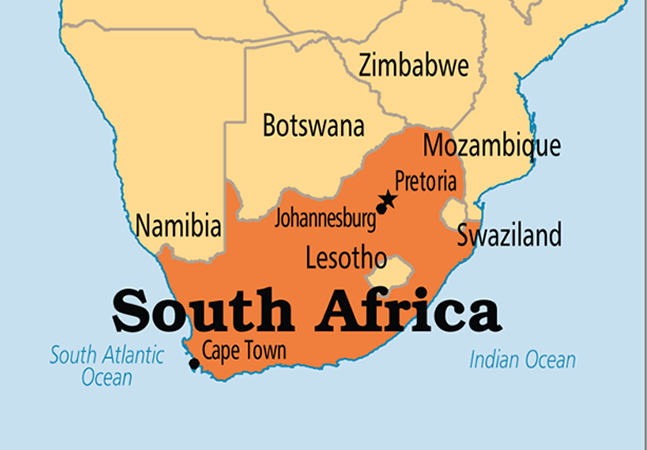Global Issues
Examining The Human Rights-Based Approach On The Access To Water In Nigeria: Lessons From South Africa -By Oyetola Muyiwa Atoyebi & Bibiana Adeniji
The right of access to basic water supply is a precursor to the enjoyment of all other human rights. Water is life, and without it, nothing organic grows. Human beings need water to drink, cook, wash and grow food. Without it, we will cease to exist”.

INTRODUCTION
Nigeria is a signatory to several international treaties which have recognised water as a human right.[i] However not many, if any, of these treaties have been domesticated and as such do not have the binding force of law. This has continued despite the several challenges faced by Nigerians in accessing safe and potable water, particularly the vulnerable in our societies.
South Africa has been hailed as one of the most proactive African countries in ensuring access to water by its citizens. The Constitution of South Africa recognises water as a human right. The government has further put in place adequate institutional machinery to ensure the proper implementation of the laws. As human rights are inalienable, it has been argued that one of the most viable means of ensuring access to safe water is its recognition as a right.
This article examines the concept of the human right to water access, the human rights-based approach; and draws out some principles in the South African legal system for possible adoption in the Nigerian legal jurisprudence.
THE HUMAN RIGHT TO WATER AND THE HUMAN RIGHTS-BASED APPROACH TO WATER
As the most recent development in the global water sector, the human right to water refers to the right of every man to easily access potable water in sufficient quantities, in line with certain fundamental principles without which the right cannot be said to have been exercised/protected. This is different from the general right to water which connotes the right of a person to use any water to which access is given, for their personal purposes.[ii]
The formal recognition of the human right to water developed from legal deductions made from earlier international human rights instruments such as the Universal Declaration on Human Rights, 1948, the International Covenant on Economic, Social and Cultural Rights 1966, the Convention on the Elimination of all forms of Discrimination against Women1997etc.[iii] In 2010, the UN General Assembly formally recognised the right to safe and clean drinking water as a human right that is essential for the full enjoyment of life and all human rights. It further enjoined all states to take all necessary steps for the full actualization of this right.[iv]
The normative principles[v] of the right include:
- Sufficiency: This means that water for domestic use must be abundantly available and such availability must be continuous[vi];
- Acceptability: This means water that is odourless, colourless, tasteless, and remains protected from external forces which could alter its purity;
- Accessibility: Easily accessed by the person needing it. According to WHO, accessibility of water means the availability of sufficient water within 100 meters from a household with the collection time not exceeding 30 minutes;
- Safe: The source must be safe for consumption and not pose any health risk) and;
- Affordability: Can be accessed by all persons irrespective of their economic status.
The Human rights-based approach to water access, therefore, discusses the fundamental principles and doctrines by which the human right to water can be said to be protected and realised. These are otherwise known as “The PANEL” principles of the human rights-based approach to water access[vii].
The PANEL represents Participation, Accountability, Non-discrimination, Empowerment, and Legal redress.
- Participation: This principle encourages the involvement of the beneficiaries of water in the decision-making, as well as the implementation of policies relating to the provision of potable water. Such participation may be active (i.e., direct involvement in decision-making), or passive (enhancing their right to know about all water-related issues and expressing their grievances on same)[viii].
- Accountability: The provision of an accountability strategy focuses on the government and officials who are saddled with the responsibility of providing access to water, and are answerable to the citizens on the nature and extent of their functions. Their performances are also assessed in their respective offices. In addition, there should be in place a method by which the citizens can request for information, or make certain claims and a punishment provided when these officials fail to respond to such requests.
- Non-discrimination. This basically resounds the idea that no person should be subjected to any form of discrimination for any reason in the provision of access to water.
- Empowerment: This discusses the viewpoint that the masses, as key stakeholders in the system, should be enabled by the law and the various institutions to make informed choices on the adoption of what procedures and strategies will suit each community in enhancing the protection of the right.
- Legal redress: This principle reverberates the need for the provision of a structure for the redress of any violation which arises in the protection of the human right to water.
THE NIGERIAN SITUATION ON ACCESS TO WATER
Nigeria is blessed with abundant water resources although the distribution is unequal, with the South having more supply than the North. However, accessing potable water still seems to be a challenge in many parts of the country, as majority of the country’s water is polluted and unsafe for human consumption. This has led to a situation whereby people source privately for water, and those who can afford it dig boreholes and wells to access potable water, while the poor masses depend on public wells and streams whose purity conditions are questionable.
Various laws exist in Nigeria regulating the use of water and various institutions have been established by these laws for their implementation. Some of these laws include the Water Resources Act 1993,National Water and Sanitation Policy 2000, River Basin Development Authorities (RBDA) Act 2004,National Environmental Standards and Regulations Enforcement Agency (NESREA) Act 2007, National Water Resources Institute Act, Nigeria Hydrological Services Act 2010 etc. institutions saddled with responsibility of providing water access include the Federal Ministry of Water, River Basin Development Authorities (RBDA) the Federal Ministry of Health (FMH), the Federal Ministry of Environment (FME), the Standards Organization of Nigeria(SON), the National Water Resources Institute (NWRI), the Nigerian Hydrological Services Agency(NHSA), the National Environmental Standards and Regulations Enforcement Agency (NESREA), Federal Ministry of Agriculture (FMA), the States’ Water Corporations and the Local Government Authorities, with the Federal Ministry of Water Resources having the overall mandate of overseeing and regulating all water related activities in Nigeria.
Although the legal and institutional framework on access to water in Nigeria are elaborate, they are not effectively coordinated and harmonized and the link between the sector’s institutions is very weak, leading to inefficiency and duplication of efforts. Moreover, most of these laws and institutions do not prioritize access to potable water, they mostly focus on water for agricultureandother purposes.This, therefore, renders questionable the readiness of the government to implement the various international agreements to which it has acceded.
THE SOUTH AFRICAN STRUCTURE ON ACCESS TO WATER
Although, geographically, South Africa does not possess many water resources, a large percentage of the country’s population enjoys access to water supply as a result of the various mechanisms put in place by their government. The human right to water as well as the attendant rights-based approach are entrenched in both the legal and institutional framework of the nation’s water sector.
Section 27 of the Constitution of South Africa 1996 (as amended), recognises the right of access to water and enjoins states to take reasonable measures to achieve the progressive realisation of the right. This provision serves as the background for the protection and guarantee of the right of access to water in South Africa. The South African structure on access to water is decentralised and several legislations and institutions exist down to the grassroots level to ensure that the majority, regardless of their social or economic status enjoy the right.
Interestingly, the principal legislations on access to water are the National Water Services Act 1997 and the National Water Act 1998, and they protect the nation’s water resources in ways that take into account the rights and needs of the people and ensure the equitable distribution of same, provide for the right of access to basic water supply, and guarantee redress against infringement. They also establish the institutional framework for the implementation of the right as well as the regulatory guidelines for their operations.
The various institutions implementing the right include the Department of Water and Sanitation, principally, the Water Boards, the Water Services Authority, the Water Services Providers (this incorporates private actors to ensure the supply of water to people at the grassroots level) the Water Services Intermediaries, the Water Services Committee etc. South Africa’s Human Rights Commission as well as the Courts are also actively involved in the enforcement and guarantee of the right.[ix]
CONCLUSION
It is believed that the recognition of the human right to access to water and the adoption of the human rights-based approach to water access by the institutions saddled with the responsibility of providing same in Nigeria, will be a step in the right direction in improving the situation on access to water in the country. It will also improve the general well-being of the citizens and enhance the educational rights of children, especially the girl child.
It is noteworthy that the lack of basic access to potable water is sufficient to halt normal life in the society, and unsafe water can hinder the right to life of the people as waterborne diseases will lead to shortage of life. The right to access water can therefore be regarded as a precursor to the enjoyment of all other human rights.
SNIPPET
The right of access to basic water supply is a precursor to the enjoyment of all other human rights. Water is life, and without it, nothing organic grows. Human beings need water to drink, cook, wash and grow food. Without it, we will cease to exist”[x].
Keywords: Human rights, access to water, human rights-based approach, South Africa.
AUTHOR: Oyetola Muyiwa Atoyebi, SAN
Mr Oyetola Muyiwa Atoyebi, SAN is the Managing Partner of O. M. Atoyebi, S.A.N & Partners (OMAPLEX Law Firm).
Mr. Atoyebi has expertise in and vast knowledge of Human Right Law Practice and this has seen him advise and represent his vast clientele in a myriad of high-level transactions. He holds the honour of being the youngest lawyer in Nigeria’s history to be conferred with the rank of Senior Advocate of Nigeria.
He can be reached at atoyebi@omaplex.com.ng
CONTRIBUTOR: BIBIANA ADENIJI
Bibianais a member of the Dispute Resolution Team at OMAPLEX Law Firm. She also holds commendable legal expertise in Human Right Law Practice
She can be reached at bibiana.adeniji@omaplex.com.ng
[i]By the UNGA Resolution 64/292, 2010, The United Nations General Assembly on the 28th of July, 2010 formally recognized the human right to water and sanitation.
[ii]See section 2 of the Water Resources Act of Nigeria 2004.
[iii]For a comprehensive analysis of the development of the human right to water, see O.L Niyi-GafarO.L, op.cit.
[iv]Paragraph 1 and 2, Resolution of the United Nations General Assembly; Sixty-fourth session, Agenda item 48.
[v]See Scanlon J. et al. (2004)Water as a Human Right? IUCN Environmental Policy and Law Paper No. 51; Gland, Switzerland and Cambridge. ISBN 2-8317-0785-4
[vi]OHCHR, 2002, ‘Human Rights, Poverty Reduction and Sustainable Development: Health, Food and Water.
[vii]See Niyi-Gafar, op.cit.
[viii]Ibid.
[ix]Mazibuko V City of JohannesburgCase CCT 39/09, (2009) ZACC 28.
[x]Regan O. in Lindiwe Mazibuko and others v City of Johannesburg and others, CaseCCT 39/09 (2009) ZACC 28 Para 1 cited in O.L Niyi-GafarO.L, Adopting a human rights-based approach to access to water in Nigeria: Lessons from Selected Jurisdictions; (LL.D Thesis, University of Pretoria 2016; 2-289).



















